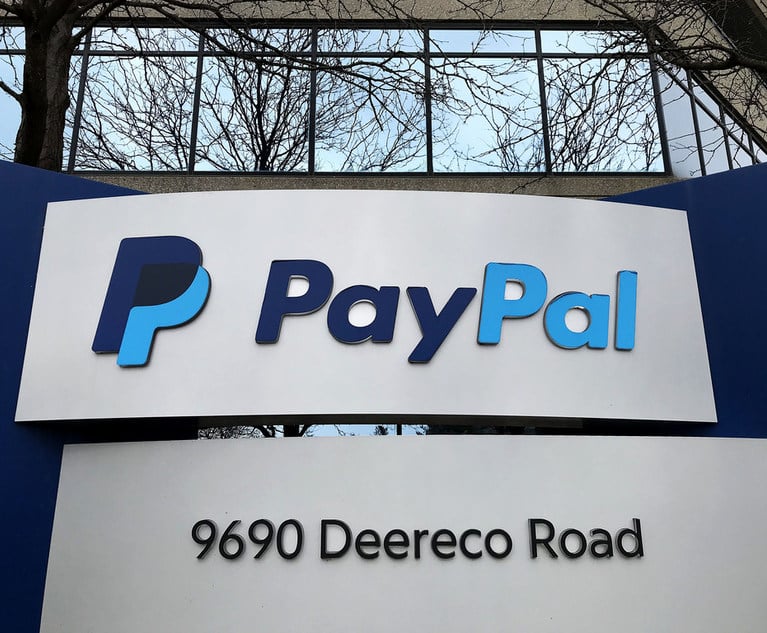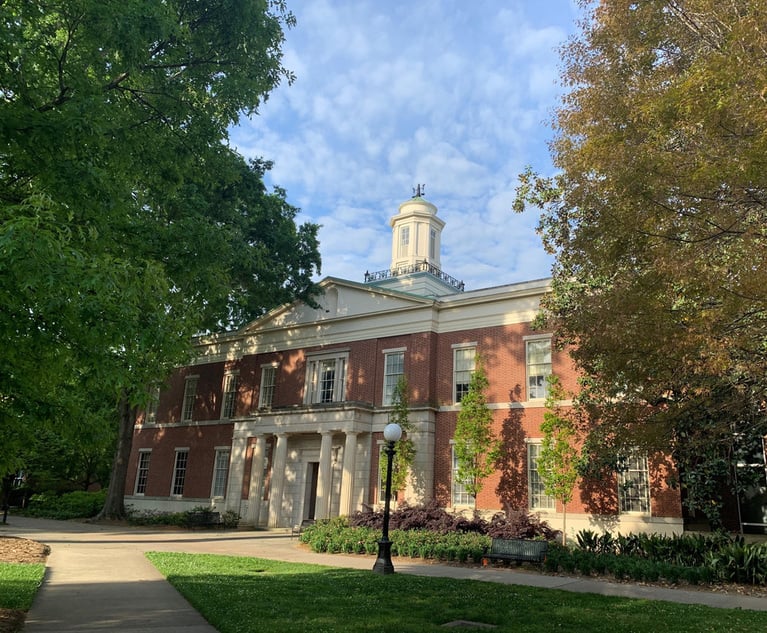Why Firms Aren't Rushing to Reopen; Am Law 100 Firms Failing Women; When Lit Funders and Whistleblowers Link Up: The Morning Minute
Here's the news you need to start your day.
June 29, 2020 at 06:00 AM
4 minute read
Want to get this daily news briefing by email? Here's the sign-up.
WHAT WE'RE WATCHING
ONLY FOOLS RUSH IN? - As we've all learned from ordering Domino's five nights a week during quarantine: just because you can do something, doesn't mean you should. New York and Illinois began allowing law firms to return to their offices last week, but many firm leaders in those cities say they're still taking it slow. The cautious approach mirrors that of a number of firms in the U.K., Australia and Asia. Meanwhile, in Texas, where several firms opened their doors back in May, a new spike in COVID-19 cases is causing firm leaders to rethink their reopenings. In our inaugural Law.com Trendspotter column, we dig into why, as one Big Law partner in Chicago put it, "law firms aren't hurrying to become test cases."
EQUITY PARTNER INEQUITY - Women constitute about 20 to 21% of all equity partners at the nation's largest law firms, so it could fairly be said that any individual Am Law 100 firm that falls short of that mark is doing a subpar job of promoting and hiring women into its equity ranks. But what about the dozen Am Law 100 firms (that we know of) where female partners account for less than 15% of the equity partners? Well, they would be grouped into a special category Careerist columnist Vivia Chen describes as "the big fat firms where women are doing poorly."
STILL STANDING - Whistleblowers notched a win last week in the burgeoning battle over whether litigation funders should be allowed to play a role in qui tam litigation. Mike Scarcella reports that the U.S. Court of Appeals for the Eleventh Circuit reinstated a $255 million judgment despite arguments by the defendants that the relator forfeited her standing in the case by arranging to give a litigation funder a cut of her potential recovery. It's unlikely to be the last time this issue arises in a similar context and it's something the DOJ has been pondering recently. Stephen Cox, then a senior leader at Main Justice and now a U.S. attorney in Texas, said in a speech in January that "aside from what the litigation finance industry says publicly, we have little insight into the extent to which they are backing the qui tam cases we are investigating, litigating, or monitoring."
EDITOR'S PICKS
Some In-Person Trials Resume in NJ State Courts, but New Jury Trials Are Still Far Off
Federal Judge Affirms City's Right to Bar Confederate Battle Flag From Parade
Roger Stone Gets 2-Week Pause on Prison Time After Judge Nixes 2-Month Request
Former Texas Gov. Rick Perry Sides With Exoneree in Fight for Wrongful Imprisonment Compensation
WHILE YOU WERE SLEEPING
RESILIENT MOFO - Launching a new practice targeting an incredibly competitive market is no walk in the park. Add in a global pandemic and not only is it no walk in the park, but the park is probably closed to visitors and the entrance is barricaded. When Morrison & Foerster launched a Latin America practice in June of last year, it had no way of knowing what obstacles lay ahead. You'd be forgiven for assuming that, one year later, things are looking pretty grim for that practice as Latin America and the Caribbean have been hit particularly hard by COVID-19. But Amy Guthrie reports that, according to the firm, its Latin America group is still plenty busy—and eyeing more work on the horizon.
WHAT YOU SAID
"I realized I was having an experience that was causing me to distance myself and not be fully who I am in the workplace because my colleagues had no idea what's going on, and I realized I'm too old for this, too old to not be who I am."
➤➤ Sign up here to receive the Morning Minute straight to your inbox.
This content has been archived. It is available through our partners, LexisNexis® and Bloomberg Law.
To view this content, please continue to their sites.
Not a Lexis Subscriber?
Subscribe Now
Not a Bloomberg Law Subscriber?
Subscribe Now
NOT FOR REPRINT
© 2025 ALM Global, LLC, All Rights Reserved. Request academic re-use from www.copyright.com. All other uses, submit a request to [email protected]. For more information visit Asset & Logo Licensing.
You Might Like
View All
Librarian's Termination Violated First Amendment Protections, Lawsuit Claims
3 minute read
SEC Sued for Failing to Reveal Records Involving Simpson Thacher Attorney
3 minute read
PayPal Faces New Round of Claims; This Time Alleging Its 'Honey' Browser Extension Cheated Consumers

Law Firms Mentioned
Trending Stories
- 1Thursday Newspaper
- 2Public Notices/Calendars
- 3Judicial Ethics Opinion 24-117
- 4Rejuvenation of a Sharp Employer Non-Compete Tool: Delaware Supreme Court Reinvigorates the Employee Choice Doctrine
- 5Mastering Litigation in New York’s Commercial Division Part V, Leave It to the Experts: Expert Discovery in the New York Commercial Division
Who Got The Work
J. Brugh Lower of Gibbons has entered an appearance for industrial equipment supplier Devco Corporation in a pending trademark infringement lawsuit. The suit, accusing the defendant of selling knock-off Graco products, was filed Dec. 18 in New Jersey District Court by Rivkin Radler on behalf of Graco Inc. and Graco Minnesota. The case, assigned to U.S. District Judge Zahid N. Quraishi, is 3:24-cv-11294, Graco Inc. et al v. Devco Corporation.
Who Got The Work
Rebecca Maller-Stein and Kent A. Yalowitz of Arnold & Porter Kaye Scholer have entered their appearances for Hanaco Venture Capital and its executives, Lior Prosor and David Frankel, in a pending securities lawsuit. The action, filed on Dec. 24 in New York Southern District Court by Zell, Aron & Co. on behalf of Goldeneye Advisors, accuses the defendants of negligently and fraudulently managing the plaintiff's $1 million investment. The case, assigned to U.S. District Judge Vernon S. Broderick, is 1:24-cv-09918, Goldeneye Advisors, LLC v. Hanaco Venture Capital, Ltd. et al.
Who Got The Work
Attorneys from A&O Shearman has stepped in as defense counsel for Toronto-Dominion Bank and other defendants in a pending securities class action. The suit, filed Dec. 11 in New York Southern District Court by Bleichmar Fonti & Auld, accuses the defendants of concealing the bank's 'pervasive' deficiencies in regards to its compliance with the Bank Secrecy Act and the quality of its anti-money laundering controls. The case, assigned to U.S. District Judge Arun Subramanian, is 1:24-cv-09445, Gonzalez v. The Toronto-Dominion Bank et al.
Who Got The Work
Crown Castle International, a Pennsylvania company providing shared communications infrastructure, has turned to Luke D. Wolf of Gordon Rees Scully Mansukhani to fend off a pending breach-of-contract lawsuit. The court action, filed Nov. 25 in Michigan Eastern District Court by Hooper Hathaway PC on behalf of The Town Residences LLC, accuses Crown Castle of failing to transfer approximately $30,000 in utility payments from T-Mobile in breach of a roof-top lease and assignment agreement. The case, assigned to U.S. District Judge Susan K. Declercq, is 2:24-cv-13131, The Town Residences LLC v. T-Mobile US, Inc. et al.
Who Got The Work
Wilfred P. Coronato and Daniel M. Schwartz of McCarter & English have stepped in as defense counsel to Electrolux Home Products Inc. in a pending product liability lawsuit. The court action, filed Nov. 26 in New York Eastern District Court by Poulos Lopiccolo PC and Nagel Rice LLP on behalf of David Stern, alleges that the defendant's refrigerators’ drawers and shelving repeatedly break and fall apart within months after purchase. The case, assigned to U.S. District Judge Joan M. Azrack, is 2:24-cv-08204, Stern v. Electrolux Home Products, Inc.
Featured Firms
Law Offices of Gary Martin Hays & Associates, P.C.
(470) 294-1674
Law Offices of Mark E. Salomone
(857) 444-6468
Smith & Hassler
(713) 739-1250









